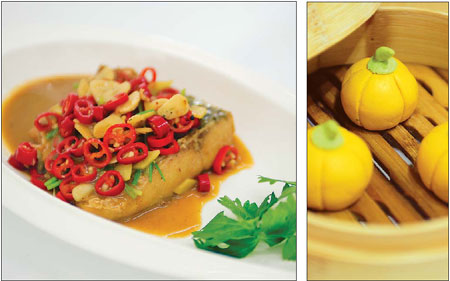Expo offers low-carbon lunches
 |
| Dishes offered by the Pure Organic Restaurant look simple but taste unique. |
Broad Pavilion offers organic growth you can taste and touch, Li Xinzhu reports.
The Pure Organic Restaurant looks like its owners went bankrupt during its construction, until you put its sparse decorations in the context of the energy-saving Broad Pavilion, in which it sits. Then it all makes sense.
The pavilion made headlines when the Expo started for having been put together in 24 hours, as well as for its remarkable savings in terms of heat and energy.
The building is several times more resistant to earthquakes than standard structures, and has a demo "quake room" on its doorstep so visitors can feel the fear of living in an unsafe environment first-hand in the Puxi side of the Expo Garden.
The restaurant follows the same socially and environmentally conscious guidelines as the pavilion.
It has plain wooden tables and chairs, and a concrete floor with fissures. On the walls hang oil paintings by Broad Group Chairman Zhang Yue, a former art teacher. In other venues, this would come across as an exercise in vanity by the chief executive. Here, it merely serves the goal of economy.
Even the food, most of which is sent down from the group's farm in Changsha, Hunan province, is economical and made using 100 percent organic products.
"This extends to the spices we use for flavoring. If we can't find the products domestically, we import them," said Li Hairong, the restaurant's manager.
The most popular dishes are the Beef with Black Pepper and Red Wine Sauce, and the Stewed Yellow Croaker with Scrambled Eggs, she said.
"The food looks simple, but it tastes quite unique," said diner Wang Junxi. "I believe the difference lies in their use of clean ingredients.
"However, I was shocked by the price considering the dining environment and the kind of (cheap) tableware they use," she said, adding that her group paid 400 yuan per person for an average-size dinner.
"Then again, everyone knows organic food is more expensive, so I probably should have expected it," she said.
Li said there is no plan to open a permanent branch of the restaurant in Shanghai, but that the matter is being taken under consideration.
Chinese people prefer sharing food to ordering individual dishes, a tradition that can produce much waste because they order banquets composed of scores of dishes.
To minimize such waste, the Pure Organic Restaurant demands customers pack up their leftovers and take them home.
"We don't want to see good food going to waste," Li said. "This is an attitude befitting an organic and low-carbon lifestyle."
Meanwhile, the kitchen, instead of being off-limits to customers, as is usually the case, is open to wandering guests, who may wish to observe how their meals are prepared.
It looks spotless, more like a science lab than a cooking area. The head chef said they try to avoid frying - the most common method of preparing dishes in Chinese cooking.
"We are devoted to providing low-carbon food," said Li. "Attention must be paid to every stage, from the selection of raw materials to the last step before the dishes are sent to the table."
Cleaning the restaurant is another area where strict "green" rules are enforced. Instead of using chemical detergent, the staff are requested to use a more environmentally friendly alkali-based compound.
"We insist on maintaining an organic environment in every aspect to inspire our customers to re-think how they live their lives," Li said.
 0
0 






